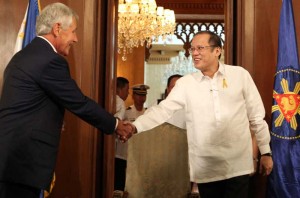The Philippines, the leading ally of the United States in Southeast Asia, welcomes an increased American military presence in its territory amid lingering tensions in the
West Philippine Sea.
But US Defense Secretary Chuck Hagel made it clear the US setting up permanent military bases in the Philippines is out of the question.
Speaking to reporters after his meeting with President Benigno Aquino 3rd on Friday, Hagel said setting up permanent bases in the Philippines would mean reviving an “outdated Cold War mentality.” He noted that the rotational presence, a new model first applied to Singapore and Australia, will be more beneficial to both countries.
“Such an arrangement would benefit both our militaries by increasing our ability to train and operate together,” he said in his speech. “Deepening engagement opportunities between our forces will further support President Aquino’s defense modernization agenda.”
The defense officials of the two countries are drafting a framework agreement that will strengthen cooperation and step up the modernization of the Armed Forces of the Philippines.
Once the agreement is complete, the Philippine government will also provide US access to Subic Bay, a former American base, National Defense Secretary Voltaire Gazmin said.
Hagel also pushed for the peaceful settlement of the maritime dispute in the West Philippine Sea, particularly between the Philippines and China.
He said “the US supports the Asean efforts to come up with the South China Sea (West Philippine Sea) Code of Conduct” and the resolution of the conflict through “internationally accepted mechanism and accordance with international law, including the law of the sea.”
He also lauded the Philippines’ efforts to bring the dispute to a peaceful end.
The Philippines recently sought arbitration in the international court to resolve the conflict in the West Philippine Sea, which is known to be rich in maritime resources and natural gases.
Meanwhile, Roland Simbulan, a political science professor at the University of the Philippines in Manila, warned the Philippines will become a “disposable pawn” in the US-China rivalry.
“We will be a disposable pawn in the US competition with China, allowing the US to further dip its fingers in the resources in the West Philippine Sea,” Simbulan said in a text message to The Manila Times. “Asean and China are the real stakeholders here, where maritime and offshore resources can be shared.”
Hosting foreign military bases is forbidden under the Philippine Constitution.
However, the Visiting Forces Agreement (VFA) which was approved in 1999, has made it easier for the US to set up a permanent, rotating military presence in the Philippines, especially in conflict areas like southern Mindanao.


